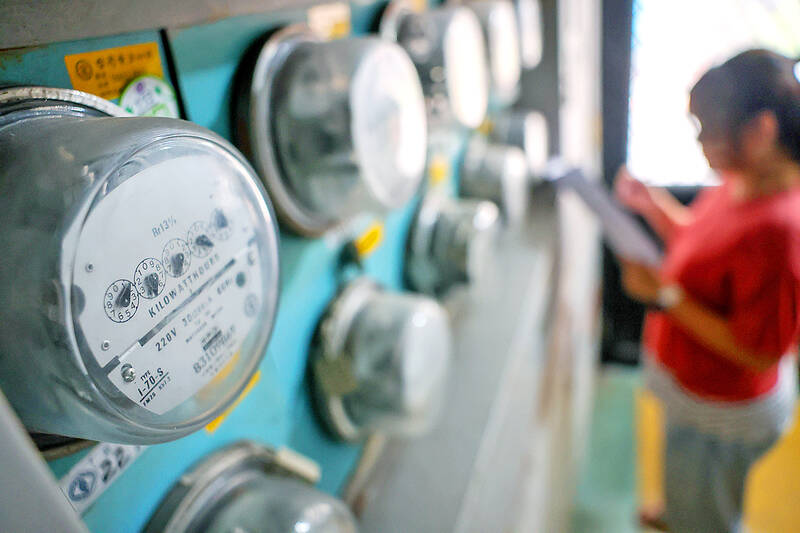Taiwan Power Co (Taipower, 台電) is to hike electricity rates by 12.5 percent on average for industrial users to reflect fuel cost surges, while leaving tariffs unchanged for households and food retailers like convenience store operators to help stabilize living costs, the Ministry of Economic Affairs said yesterday.
The ministry announced the new electricity price scheme after an energy price review committee wrapped up its biannual meeting.
That marked the fourth price increase in three years for industrial users.

Photo: CNA
The state-run utility has to rationalize its power tariffs gradually to support its grid construction projects to boost power supply, the ministry told a media briefing yesterday.
Based on the new price scheme, industrial users would see their electricity bill increase by up to 14 percent if they consume more power this year than last year, Taipower said.
Semiconductor companies fall under this category, the company said.
Electricity rates for industrial users whose power consumption drops by at least 5 percent and revenue dips by at least 15 percent year-on-year would remain unchanged to ease their financial burden, Taipower said.
Scooter and component makers fall under this category, it said.
Some industrial users would see less steep price hikes of about 7 percent, if their power consumption falls by at least 5 percent and their revenue drops by less than 15 percent, Taipower said.
After the price adjustments, industrial electricity rates would climb to NT$4.29 per (US$0.1355) unit on average, which is still lower compared with that of South Korea at NT$4.65 per unit in the first half of this year.
Local exporters would remain competitive in terms of power costs, the ministry said.
That is quite different from Taipower’s past mechanism when industrial users that are heavy power users faced more drastic hikes. Now, power conservation seems to play a bigger role in deciding price increases.
The new electricity tariffs are to take effect from Oct. 16 when the summer power rates expire.
The latest price increases would inject NT$15 billion in additional revenue for Taipower in the remainder of the year, while it would add 0.03 percentage points to the nation’s inflation indirectly this year, Taipower vice president and spokesman Tsai Chih-meng (蔡志孟) said.
Taipower expects the price hikes to help narrow its losses to about NT$80 billion per month, as it is still making losses from supplying power to households, Taipower president Wang Yao-ting (王耀庭) told a media briefing.
Electricity tariffs for households stand at NT$2.77 per unit on average, significantly below Taipower’s costs of NT$3.9 per unit, the company said.
Taipower would still need the government’s subsidy and the legislature’s support to absorb accumulated heavy losses of NT$400 billion, Wang said.
The Cabinet has budgeted NT$100 billion in subsidies each for this year and next year, which are still subject to the legislature’s approval.

DAREDEVIL: Honnold said it had always been a dream of his to climb Taipei 101, while a Netflix producer said the skyscraper was ‘a real icon of this country’ US climber Alex Honnold yesterday took on Taiwan’s tallest building, becoming the first person to scale Taipei 101 without a rope, harness or safety net. Hundreds of spectators gathered at the base of the 101-story skyscraper to watch Honnold, 40, embark on his daredevil feat, which was also broadcast live on Netflix. Dressed in a red T-shirt and yellow custom-made climbing shoes, Honnold swiftly moved up the southeast face of the glass and steel building. At one point, he stepped onto a platform midway up to wave down at fans and onlookers who were taking photos. People watching from inside

A Vietnamese migrant worker yesterday won NT$12 million (US$379,627) on a Lunar New Year scratch card in Kaohsiung as part of Taiwan Lottery Co’s (台灣彩券) “NT$12 Million Grand Fortune” (1200萬大吉利) game. The man was the first top-prize winner of the new game launched on Jan. 6 to mark the Lunar New Year. Three Vietnamese migrant workers visited a Taiwan Lottery shop on Xinyue Street in Kaohsiung’s Gangshan District (崗山), a store representative said. The player bought multiple tickets and, after winning nothing, held the final lottery ticket in one hand and rubbed the store’s statue of the Maitreya Buddha’s belly with the other,

‘NATO-PLUS’: ‘Our strategic partners in the Indo-Pacific are facing increasing aggression by the Chinese Communist Party,’ US Representative Rob Wittman said The US House of Representatives on Monday released its version of the Consolidated Appropriations Act, which includes US$1.15 billion to support security cooperation with Taiwan. The omnibus act, covering US$1.2 trillion of spending, allocates US$1 billion for the Taiwan Security Cooperation Initiative, as well as US$150 million for the replacement of defense articles and reimbursement of defense services provided to Taiwan. The fund allocations were based on the US National Defense Authorization Act for fiscal 2026 that was passed by the US Congress last month and authorized up to US$1 billion to the US Defense Security Cooperation Agency in support of the

‘COMMITTED TO DETERRENCE’: Washington would stand by its allies, but it can only help as much as countries help themselves, Raymond Greene said The US is committed to deterrence in the first island chain, but it should not bear the burden alone, as “freedom is not free,” American Institute in Taiwan Director Raymond Greene said in a speech at the Institute for National Defense and Security Research’s “Strengthening Resilience: Defense as the Engine of Development” seminar in Taipei yesterday. In the speech, titled “Investing Together and a Secure and Prosperous Future,” Greene highlighted the contributions of US President Donald Trump’s administration to Taiwan’s defense efforts, including the establishment of supply chains for drones and autonomous systems, offers of security assistance and the expansion of